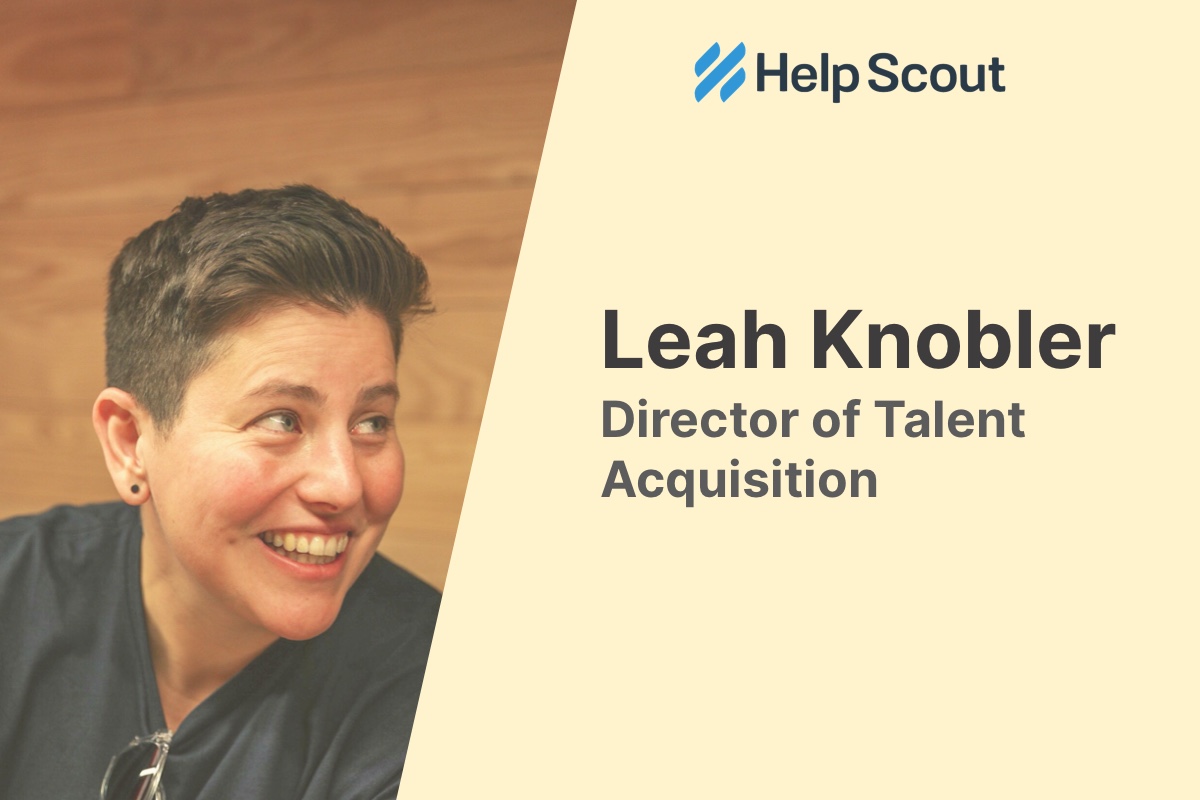Help Scout is a globally distributed B-Corp and customer service product, that has been around for almost a decade. During that time, Leah Knobler played no small part in growing their team and operations to over 110 people. In our interview, we talk about hiring for remote positions, how Covid-19 impacts remote-first businesses and how communication works in a larger remote team.
"We get to hire amazing talent without being limited by geography"
Hey Leah, thanks for having this talk with us! You are the Director of Talent Acquisition at Help Scout, a well-known remote-first company. Can you tell us more about Help Scout, to start things off?
Help Scout makes customer support tools that are helpful and human! We’re about 110 people all over the world and we’re also a Certified B Corp, which means we’re serious when we say we care about profit and purpose. We’ve been a remote-first company since we started about 9 years ago.
What do you do in your position as Director of Talent Acquisition?
I run all things relating to talent acquisition – recruiting, hiring, and employer brand – sprinkled with some fun remote culture stuff on top. On any given day, I’m on the lookout for our next great teammate, running a hiring process, writing for our company blog, or making videos to keep our remote team connected and engaged.
What are the challenges in recruiting, hiring and onboarding remote talent? How do you overcome them?
Similar challenges in recruiting, hiring, and onboarding exist whether you’re remote or co-located! But I think being a remote team actually gives us the advantage when it comes to recruiting and hiring. We get to hire amazing talent without being limited by geography!
Remote onboarding can be a challenge if you aren’t extremely thoughtful and intentional in how you set up a new teammate. While it’s certainly nice to onboard in person at an office, it isn’t essential, and I think the pandemic has proven that.
"We still believe some things are best left to be done in real time"
Help Scout operates fully remotely. Why? Wouldn’t it be easier to have everything centralized?
Our co-founders wanted to be able to hire great people anywhere while also optimizing for work/life balance! You don’t need to have your people all in the same physical location in order for centralization. We have shared tools and a knowledge base where everyone in the company knows to go to find answers and document decisions.
What role does the headquarter office in Boston play at Help Scout? What percentage of the team goes there? What is the space usually used for?
Ironic timing! We’ve decided to sublet our Boston office space for the year since it’s unclear how long the pandemic will last. Before COVID, we did enjoy using the space for onboarding new hires, small team meetups, and of course regular work.
With your team being fully distributed across the globe, how does communication work at Help Scout?
We have very detailed “communication guidelines” that shape our norms and expectations around how we communicate as a company. It covers everything from our guiding principles, to Slack best practices, to how to use your Google calendar. It really helps to get granular about these things so that we reduce confusion and maximize clarity.
We’re in Slack every day, which serves as the space for chatter about work as well as fun. While we love asynchronous communication, we still very much believe that there are some things best left for doing together in real time over Zoom, such as kicking off new projects or giving hard feedback.
How has COVID-19 impacted your business? Which new challenges arose?
It was hard to know how COVID-19 would impact the business so we changed course quickly and really made conservative plans. We were about 10 days away from our spring retreat in Dubin, Ireland when we had to make the really difficult decision to cancel the entire thing. But the pandemic has also inspired us to be creative, and we pivoted to virtual retreats as a short-term, effective replacement.
What has been the best part of being an all-remote company? What has been the worst?
One of my favorite things about being part of a remote company is the freedom and flexibility I have to work from just about anywhere so long as there’s a reliable internet connection! It’s also very special to have work friends all over the world and to learn from each other.
No worst parts! The only hard thing is not being able to see each other as much as we’d like.
If you could give one piece of advice to all businesses which were forced to become remote organizations in the past few months, what would it be?
Be intentional about everything – how you communicate, how you celebrate your wins, how you document decisions, how information is shared, how you build connection and engagement. You really need to think through each of these so that your company can work together successfully. And of course, hire People Ops people to help!
Where can we find out more about your and Help Scout?
Always happy for more followers on Twitter: LEAHisKNOBLER and of course LinkedIn. And check out www.helpscout.com/about to learn more about us.
